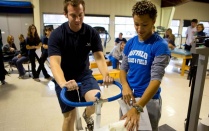Faculty Spotlight
Todd Rideout, PhD

Todd Rideout is an assistant professor in the Department of Exercise and Nutrition Sciences (ENS).
Todd Rideout, PhD, began his faculty appointment with the University at Buffalo in January of 2011. During his PhD program, Rideout examined the molecular basis for the cholesterol-lowering effects of dietary fiber in the pig model. Rideout’s postdoctoral training at the Richardson Centre for Functional Foods and Nutraceuticals, University of Manitoba, examined metabolic factors that influence the substantial inter-individual cholesterol-lowering effects of phytosterols in human subjects.
At UB, Rideout conducts research that examines the relationship of diet to cardiovascular disease risk.
"We're a lipid lab, so we deal with cardiovascular risk factors that probably everyone is aware of and have concerns about," explains Rideout. "We look at total cholesterol levels, both ‘good’ and ‘bad’ cholesterol levels, and triglycerides. These are all risk factors in the blood, so we're looking at different dietary therapies that will help move these lipid risk factors in a healthy direction and therefore, modulate your risks for cardiovascular disease and obesity."
More specifically, Rideout and his team of students examine dietary supplements, or dietary bioactive compounds.
"These are very specific dietary compounds that are known to have some sort of health promotion effect. Right now most of my efforts deal with phytosterols, which are plant based cholesterol-lowering compounds," says Rideout.
Phytosterols and Hypercholesterolemic Pregnancies
In 2013, Rideout received a 5 year National Institute of Health training grant to examine how phytosterols could be used to treat pregnant women with high cholesterol with a focus on maternal, as well as offspring health.
"If you look at blood cholesterol levels during a normal pregnancy, every woman is hypercholesterolemic," explains Rideout. "But for women that have high cholesterol even before they become pregnant, their levels escalate to excessive levels during pregnancy causing a condition known as supraphysiological hypercholesterolemia."
While there are currently cholesterol-lowering drugs on the market, like statins, Rideout says those drugs are not considered safe for use during pregnancy.
"The problem right now is that a lot of these lipid lowering drugs are contraindicated for women who wish to become pregnant or are already pregnant, so there is a real need to find some kind of alternative cholesterol lowering therapy for these women."
Rideout also notes that one of the big treatment dilemmas for doctors is that there are a lot of unknowns about the effects that many cholesterol-lowering drugs have on fetal growth and development, and that further research is needed to better understand the potential long-term impacts on children born from woman with high cholesterol levels.
"A lot of research shows that offspring of women who have excessive blood cholesterol levels during pregnancy are at an increased risk for cardiovascular disease. Offspring are also predisposed to having high cholesterol when they are born and even have early signs of fatty streaks in their arteries which can develop into arterial lesions as they get older."
Thinking Outside the Box
What makes this research unique, says Rideout, is that it takes an outside-the-box approach to a common area of research.
"In terms of research in the maternal programming field, it is usually about all the bad things that can happen if an offspring is brought up in an environment where the mother consumes high fat or high cholesterol diets or when a mother is over or under nourished," says Rideout. "But very little work has been done to study how phytosterols or other health promoting dietary compounds may change the in utero environment and how that will potentially impact or change the disease risk for the offspring."
Next Steps and Real World Implications
Several years into a five year grant, Rideout and his team of student workers have completed the first phase of the project. Two pre-clinical models have been produced but more work is to be done according to Rideout.
“Just because a compound is natural doesn't mean it is safe. We have a lot of work to do to make sure that these alternative therapies, such as phytosterols, are safe for both mother and child," says Rideout. “The next steps are to actually look at arterial lesion development. We want to dive a little deeper to see if we can actually limit the growth of an arterial lesion or regress the growth of one.”
All of this research, Rideout hopes, will results in some positive health benefits to pregnant women and their children in the future.
"It’s this concept of maternal programming. It’s about figuring out what an increase of risk we have for all kinds of different diseases and how that relates to a mother and the whole environment a child grows up in, both in utero and after you are born. A lot of questions still remain, but hopefully we're doing something that downstream, can result in positive health benefits."
